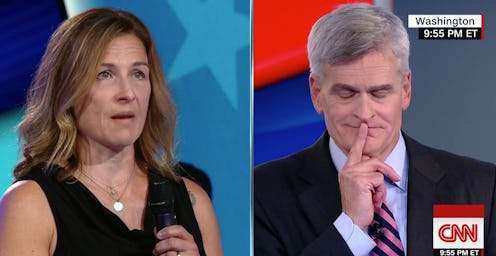News
Bill Cassidy Gets These Planned Parenthood Facts Woefully Wrong

On Monday night, four senators joined together on CNN to debate the topic of health care. Sens. Bill Cassidy (R-La.) and Lindsey Graham (R-S.C.) came ready to defend the Obamacare repeal bill the pair had introduced in the Senate. And though he co-authored the bill himself and often touts his past career as a physician, Sen. Cassidy's response to a question about defunding Planned Parenthood didn't come across as well-informed.
Under the Graham-Cassidy health care bill, Medicaid recipients would be unable to get health care from Planned Parenthood reimbursed by the government. In addition, the bill would would forbid premium subsidies from going to any insurance plan that covers abortion.
Lori Hawkins, an audience member from Wisconsin, spoke to Sen. Cassidy about her experience with Planned Parenthood — she said had helped her get pregnant after she had found cysts on her ovaries. She asked the Louisiana senator why he wanted to cut funding for the care that had helped her and many others both stay healthy and start families.
Senator Cassidy, when I was in my mid-20s, Planned Parenthood discovered that I had large cysts and benign tumors in and on my ovaries. I'm grateful for Planned Parenthood, because without their care, it's quite probable that my husband and I would not have been able to become parents.
Why would you advocate for a bill that would block women like me from the essential care that helped me to become a mother, provides affordable cancer screenings for thousands and thousands of people, especially for those who live in the many parts of this country that are not served by community health centers?
Cassidy's response started out with a claim about Planned Parenthood that doesn't seem to align with the facts: "Most Planned Parenthood settings are in urban areas — urban areas that have lots of OB/GYNs."
But according to the organization, that's just not true: 56 percent of Planned Parenthood clinics are in "health professional shortage areas, rural or medically underserved areas," according to a comparison of the locations of clinics with the Department of Health and Human Service's designation of medical shortage areas. There are even 105 counties in the United States where Planned Parenthood is the only clinic providing birth control.
If you watch the clip, you can see that when Cassidy assumes that the doctor the questioner saw at Planned Parenthood probably referred her to a different one, she shakes her head "no." But beyond the factual inaccuracy, his response on Planned Parenthood makes up a means of fixing issues of rural women's health that don't seem to be part of the bill he supports.
Sen. Cassidy proposes cutting off Planned Parenthood in order to transfer doctors and health care funding to rural areas. But the bill he is advancing doesn't include anything like that — instead, it mostly dismantles many of the structures the federal government has in place to guarantee health coverage to its citizens, and leaves the task of building new ones to the states.
Perhaps Sen. Cassidy assumes that states, under this bill, might be inclined to use the funding that would no longer go to Planned Parenthood to fund rural clinics. But that would assume that states, especially states that have previously had problems with women's health, would be willing or able to fix this problem without Planned Parenthood.
For example, Texas, the state that would end up with the highest increase in federal funds under Graham-Cassidy, actually did defund Planned Parenthood in 2011. This led to an estimated 45,000 women losing access to health care and an overall decline in women's health outcomes. The state has the highest maternal mortality rate in the developed world, though experts are unsure how connected that is to Planned Parenthood closures specifically.
Planned Parenthood pushed back against Cassidy's comments. Erica Sackin, the Director of Political Communications at Planned Parenthood for America, tells Bustle via email:
Preventing women with low incomes from coming to Planned Parenthood for care would mean more women would go without basic health care like birth control, cancer screenings and STD testing and treatment — especially as rural hospitals are shuttering their women's health resources across the country. If you want to help women in rural America — or any part of America — access quality care, the answer is simple: stop attacking health care at Planned Parenthood.
Sen. Cassidy, however, doesn't seem to agree.